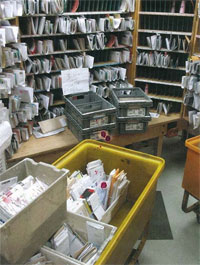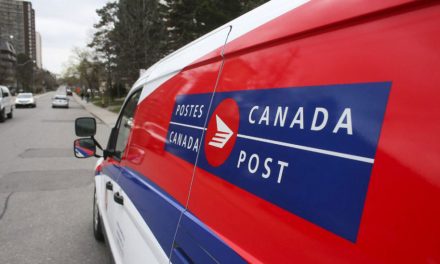
Government set to force Canada Post restart
The Canadian government said yesterday it is preparing back-to-work legislation to restore mail services across the country after Canada Post shut down almost all of its operations. Labour minister Lisa Raitt told Parliament that Canada Post and the striking union, the Canadian Union of Postal Workers (CUPW), showed no signs of being able to reach a negotiated settlement, which she said was “a great disappointment for us because of the effect it has on Canadians and on the Canadian economy”.
The minister confirmed: “As a result, tonight we will be putting on notice legislation to restore mail delivery service for Canadians.”
Yesterday in Parliament, Canada’s Prime Minister Stephen Harper also noted the impact on the nation’s economy from the postal strikes, which started on June 3rd and rotated through various urban areas before yesterday’s full lock-out by Canada Post.
Harper said the continuing dispute threatened greater damage on other parties in the Canadian economy, and added: “That is not acceptable to the government. This government will act to ensure that the Canadian economy and the wider interests of the Canadian public are protected.”
The back-to-work bill, to be called the “Restoring Mail Delivery for Canadians Act”, could be introduced in Parliament on Friday, and is expected to take until next week to be passed by lawmakers. It is understood that the legislation would force an end to the lock-out of workers from postal facilities, and mandate an arbitration process.
The CUPW said last night that back-to-work legislation would deny its 48,000 urban workers the right to free collective bargaining, adding that the emergency measure was “unnecessary, unjust and counterproductive”.
“If this bill passed, we would have the very outcome that nobody wants,” said Lemelin. “An imposed settlement brings down terms that neither party has agreed to.”
Canada Post yesterday closed all mail processing plants and letter carrier depots, and is not accepting any new mail. Some limited delivery is taking place by rural carriers that are not subject to the CUPW’s urban unit, though this will likely be for a few days to clear mail remaining in the system.
Public mail boxes have been sealed, and post offices in urban areas closed. Post offices in rural areas remain open, but cannot accept new mail.
Canada Post, which said it cannot predict how long the current labout situation will last, noted that its digital mail service, epost, is fully operational and remains “recommended” for consumers to use for important communications including statements and bill payments.
- UPDATED: The US Postal Service said today (June 16) that since the Canadian government is to force resumption of Canada Post operations, it will continue to accept mail bound for Canada until further notice. To avoid any disruption, USPS advised using its premium Global Express Guaranteed (GXG) service, in which items are passed on to FedEx Express.
Losses

Mail waiting to be delivered in Montreal
With mail volumes dropping by 50% even before the reduction in postal services, both the union and Canada Post have blamed each other for the postal disruptions.
The CUPW blamed Canada Post’s move to cut deliveries to three-days-per-week, and yesterday’s full lock-out.
But, Canada Post has seen its losses incurred since the strikes began 13 days ago reaching around $100m, and said mail volumes were cut in half even before service reduction.
Although the union’s industrial action was only for short periods of time, revolving around different cities, the action overall prompted mailers across the country to find alternative communications channels, and saw the public staying away from post offices.
Commentators have pointed out that this summer’s strike action, the first postal strikes in Canada since 1997, is the first postal work stoppage when there have been viable digital alternatives available for transactional mail, which could cause permanent damage to Canada Post.
Despite the separate arrangement for pension and benefit cheques, in which volunteers will deliver the cheques to pensioners and those on low income, the Canadian Government was yesterday continuing to urge people to sign up to receive their benefits through electronic means.
Diane Finley, minister of human resources and skills development said the government’s direct deposit system was a secure, convenient and reliable way to receive benefit payments. She said: “We are encouraging those people who have not already signed up for direct deposit to visit the Service Canada website and enrol for this service.”
Conflict
The disagreement between the union and the Crown Corporation over a new four-year wage deal, that would run from February 2011, stems from Canada Post’s attempt to cut operating costs to respond to declining mail volumes. The union, meanwhile, wants reward for its members for 16 years of profitability at the Corporation.
Key areas of conflict include annual wage rises, a reform of sick leave entitlement, and certain changes to working practices under Canada Post’s $2bn network modernisation initiative.
Canada Post said yesterday its CEO Deepak Chopra was prepared to meet once again with the leader of the CUPW, Denis Lemelin, to discuss the Corporation’s latest “fair offer”.
In a statement, the Corporation said it expected Lemelin to arrive at the meeting with a “meaningful offer” to address mail volume issues and a $3.2bn hole in Canada Post’s pension fund.
Previous meetings between the two have seen little movement, particularly from the union. Canada Post has offered joint reviews of arrangements such as the sick-leave reform proposal, the Short-Term Disability Plan, and has backed off on lower wages for new workers.
The Corporation said it regretted inconvenience to the Canadian public, but stressed that arrangements to deliver more than 2m welfare and pension cheques would continue under a separate agreement with the union.











